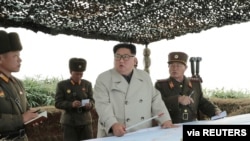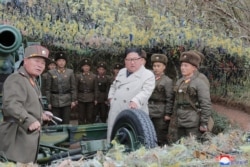Analysts say a provocative North Korean artillery exercise near its border with the South may be the beginning of a stepped-up campaign to try and force the United States to end what it sees as hostile policies ahead of its self-declared year-end deadline.
North Korean leader Kim Jong Un, "is conducting a full-court maximum pressure [campaign] against the [South Korean]-U.S. alliance to try to coerce the alliance into providing concessions, namely sanctions relief," said David Maxwell, a former U.S. Special Forces colonel and current senior fellow at the Foundation for Defense of Democracies.
Kim recently visited North Korean armed forces at the inter-Korean border island of Changrin, where he instructed the troops to practice firing artillery and prepare for a "real war-like drill with higher degree of intensity," according to a statement released Monday by the country's official Korean Central News Agency (KCNA).
KCNA said the exercise was a"delight" to "the Supreme Leader" but it did not identify the type of weapons fired or the exact date of the visit, saying simply that it was on "an ordinary day like today."
North Korea launched an artillery strike on a South Korean island from the Changrin Islet in 2010, killing four people. That same year, North Korea was accused of torpedoing a South Korean warship near the border, killing 46 sailors.
South Korea's defense ministry said the drill reported by KCNA violated the inter-Korean Comprehensive Military Agreement, which was concluded in Pyongyang in September 2018 with a goal of reducing military tension between the two Koreas.
The report came just over a week after the United States announced it will postpone a joint air defense drill with South Korea in order to facilitate denuclearization talks with North Korea.
Those talks have been stalled since the breakdown of the Hanoi Summit in February, when President Donald Trump rejected Kim's proposal to dismantle a part of North Korea's nuclear weapons program in exchange for sanctions relief. Trump instead asked Kim for full denuclearization before any lifting of sanctions.
The last round of working-level talks in Stockholm in October broke down quickly. North Korea walked away from the negotiating table complaining the U.S. failed to come up with an acceptable offer.
Experts warn that North Korea's latest drills could foreshadow more provocations.
Robert Manning, a senior fellow at the Atlantic Council, said Kim's visit to Changrin was aimed at placing "more pressure on the U.S. to make concessions with a subtle hint that this could be the beginning of more provocative military activities."
Ken Gause, director of the Adversary Analytics Program at CNA, agreed. "I suspect at some point we're going to start seeing more missile tests and things like that are going to raise the tension on the peninsula."
Gause added that North Korea feels it needs "to speak with a very large megaphone to get [Trump's] attention" because he is occupied with impeachment hearings and other issues.
Bruce Bennett, a senior defense analyst at the Rand Corporation, said, "Kim is trying to put serious pressure on the United States to accept a deal with substantial U.S. compromise. ... Kim apparently thinks that if he keeps turning up the pressure, eventually President Trump will give in."
The experts said Kim may be under pressure himself.
"Kim may be facing enormous internal pressure from the military and regime elites because he has had three meetings with Trump and he has failed to get sanctions relief as most in North Korea have expected since [the first summit in] Singapore [in June 2018]," said Maxwell. "Therefore, he must act out' to demonstrate his strength to his people and put pressure on the alliance."
Similarly, Bennett said Kim "has not been able to achieve significant sanctions reduction despite what I am told he has promised his elites many of whom are entrepreneurs going bankrupt each time he has gone to a summit meeting in 2018 and 2019."
Bennett said Kim feels the need "to refocus his people on the external military threat that he says is posed by the United States. And he has to make the U.S. threat appear really serious by telling his people that they need to be ready for war."
North Korea's Vice Minister of Foreign Affairs Choe Son Hui said last week Pyongyang is not interested in continuing negotiations with the U.S. unless Washington drops "all of its hostile policy" against North Korea.
Although it is unclear what specifically Pyongyang means by "hostile policy," it has called for a permanent end to joint military drills which the U.S. regularly conducts with South Korea in addition to sanctions relief. North Korea views the drills as invasion exercises threatening its regime.
Maxwell said Pyongyang will not consider that hostile policy to have been removed "until there is an end to the [South Korean]-U.S. alliance, U.S. troops removed from the peninsula, an end to extended deterrence and the nuclear umbrella over [South Korea] and Japan."
He said this is also what North Korea has in mind when it talks about the "denuclearization" of the Korean Peninsula.
Gause said North Korea's improving relationship with China also plays into its calculations.
"China definitely wants the U.S. off the peninsula … [The North Koreans] are trying a last-ditch effort to get President Trump to pay attention and shift his policy. Otherwise, they're going to have to start carrying China's water on some of this including probably ramping up calls for U.S. troop withdrawal, in addition to heavy complaining about the joint military drills."







